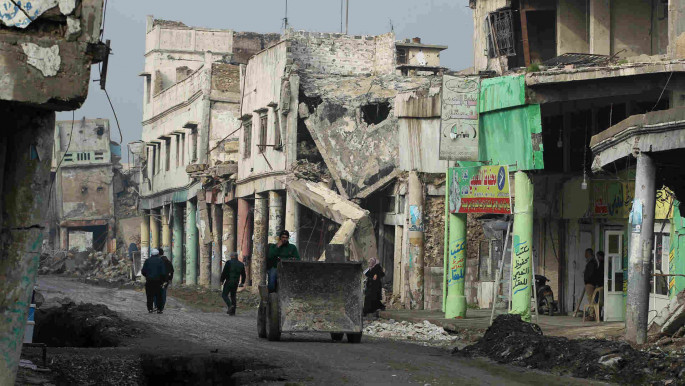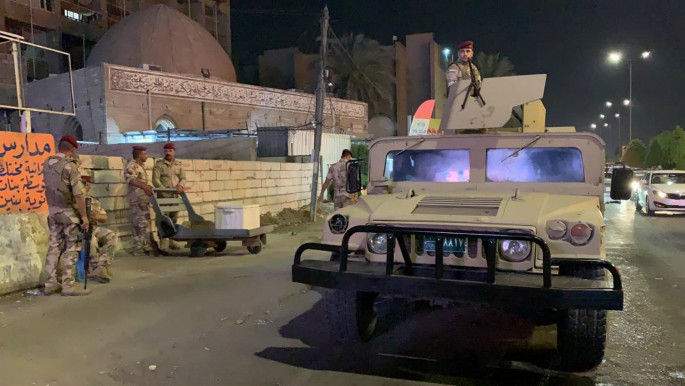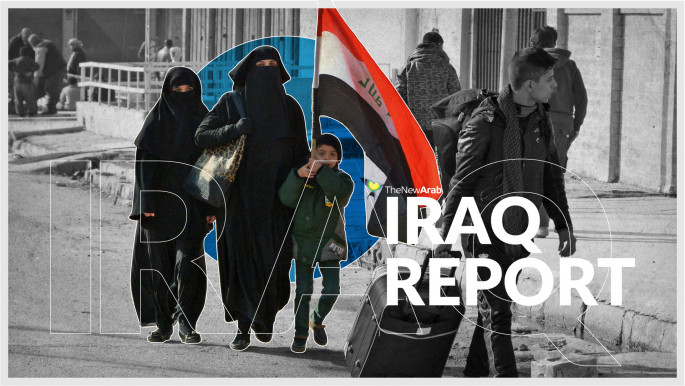The Iraq Report: Shia militia domination of Iraq feeds IS growth
The Popular Mobilisation Forces (PMF) defy the regular army and ignore the federal government's orders, showing they answer to more powerful masters than their country's leadership.
IS are still an active threat in Iraq and are becoming even more emboldened in neighbouring Syria where they can easily infiltrate across the porous border. The Iraqi government will struggle to deal with a resurgent IS as it has yet to tackle the reasons behind why IS rose in the first place.
Without government efforts to de-sectarianise Iraqi politics and society, groups like IS and the pro-Iran militias will always find Iraq a fertile ground for their extreme ideologies.
Shia militia activities show who really controls Iraq
It is widely acknowledged that Iran's Islamic Revolutionary Guard Corps (IRGC) controls and directs dozens of proxy Shia militias in Iraq, and this phenomenon has existed in the country ever since the US-led invasion that toppled former strongman Saddam Hussein in 2003.
Now mostly fighting under the umbrella of the Popular Mobilisation Forces, these militias have gathered outsized influence and power after fighting against IS alongside US-backed Iraqi troops.
The PMF was formally incorporated as a separate service in the Iraqi armed forces in 2016. This has allowed them access to not only the state's defence budget, but armouries full of American-made weapons are now open to them, complicating US efforts to curtail the power of Iranian proxies.
 |
Without government effort to de-sectarianise Iraqi politics and society, groups like IS and the pro-Iran militias will always find Iraq a fertile ground for their extreme ideologies |  |
This parallel army within the overall armed forces structure is reminiscent of how the IRGC itself exists and operates within Iran and, given the links between the PMF and IRGC, concerns are now being raised that the PMF is being groomed to become the Iraqi version of the IRGC.
However, following US claims that IRGC-backed Iraqi Shia groups were responsible for a drone attack on the Saudi Arabian east-west oil pipeline in May, the government of Prime Minister Adel Abdul-Mahdi announced in July that it would be banning the militias and would require militants to press themselves into the armed services, or else lay down their arms and join the political process.
More than a month later, however, and there appears to be no sign that the Iraqi government can enforce their own decrees as PMF units defy orders from the army to hand over their checkpoints in the northern Nineveh governorate.
Nineveh's capital is not only the city of Mosul where IS established its Iraqi capital, but is also home to an ethnically and religiously diverse population. However, the majority of its residents are Sunni Arabs who are seen as the ethno-religious group that has been most severely negatively impacted by the sectarian policies of the Shia-dominated federal government.
 |
|
| Read more: The Iraq Report: Iraq wants France to pay millions for ‘justice’, as US-Iran tensions hit |
The PMF units operating illegal checkpoints throughout Nineveh recruit from the minority Shabak, Shia Turkmen, and Christian communities. Quite apart from a litany of human rights abuses perpetrated during the recapture of Mosul and other cities, some members of the PMF, including Shabak chief Waad Qado and Christian chief Rayan al-Kildani, have been sanctioned by the US as recently as last month for "serious human rights abuses."
If even minority communities are not afraid to defy the Iraqi government and the rest of the armed forces, then this suggests that their confidence stems from being patrons of a higher power – Iran.
Due to the way that Iraqi politics, the state, and the security forces interface with one another, there has been a considerable osmosis of pro-Iran militia figures moving between these supposedly distinct spheres, garnering the support of high ranking and influential clergymen while operating a number of illicit enterprises, while yet others control powerful ministries and their budgets.
For example, Hadi al-Ameri, the leader of the IRGC-backed Badr Organisation, is not only a militant commander, but he was also once a cabinet minister and continues to wield significant influence via his lieutenants in the interior ministry.
As long as this continues to be the case, it is highly unlikely that anything will be done about serial human rights abusers, drug and sex traffickers linked to the PMF, or any number of other criminal elements. Experts have stated that when an arrest does occur, it is usually because those detained have become too greedy and stopped their kickbacks to more powerful figures looking for their cut.
IS remnants still pose a threat
As if the activities of Shia militias were not concerning enough, a deadly foe is once more rearing its head in Iraq. Although the Islamic State group was declared defeated in July 2017 by then-Prime Minister Haider al-Abadi, the Sunni militants appear to be making a comeback.
 |
A deadly foe is once more rearing its head in Iraq. Sunni militants appear to be making a comeback |  |
IS activities have become so pronounced that the government launched an operation early last month dubbed "Will to Victory" in the hopes that they could clear out IS remnants operating in the western Anbar desert near the Syrian border, as well as in the Salahuddin and Diyala governorates – all primarily populated by the Sunni Arabs.
These operations were declared largely successful, yet Iraqi military and police units have been deployed to areas even around Baghdad. Tarmiyah, just north of the Iraqi capital, was the target of a raid a fortnight ago as security forces searched for weapons caches and hidden explosives.
IS came dangerously close to capturing Baghdad after they blitzed across and conquered a third of Iraq in 2014, and amongst the first operational objectives declared by US and Iran-backed Iraqi forces was to secure the capital against further IS threats before moving to recapture territory.
The fact that IS are still active in Tarmiyah and other areas around the so-called "Baghdad Belt" of towns and villages that surround the capital suggests that the authorities have not been successful in quashing IS cells as they had originally let on.
This is likely because IS as an ideology has not been effectively challenged, as it is seen as a reaction to extremism foisted upon the Iraqi people by hardline pro-Iran groups.
 |
|
| Read more: The Iraq Report: US interests face attack in Iraq as tensions with Iran heighten |
During the war to defeat IS' "caliphate", Iraqi forces and allied PMF militias were accused by Human Rights Watch and others of having committed atrocities. Videos emerged of PMF troops battering children with sledgehammers, and PMF commanders openly stated that the battle for Mosul would be an opportunity to enact sectarian vengeance against Sunnis.
Since IS' defeat, and more recently, these sectarian abuses have continued, with large internment camps set up for "IS families" who have effectively been cut off from any future prospects, rampant torture to force false confessions of IS membership in Iraqi prisons, and thousands detained, including children, in degrading conditions.
Again, the vast majority of these abuses have come at the hands of the Iraqi security forces and allied PMF militants, and they have targeted the Sunni Arab demographic. Such a viciously sectarian approach does nothing to curtail IS, but in fact feeds their propaganda that Iraq is not a country for all Iraqis, but is in fact a sectarian nightmare designed to persecute the Sunnis.
Today, IS still has hundreds of millions of dollars at its disposal and is carrying out abductions, assassinations, and bomb attacks.
According to a report released by UN chief Antonio Guterres on Monday, IS' finances are very healthy and are made more robust by the fact that they no longer have territory to administer to and control. They can therefore finance terrorist operations in Iraq, Syria, and even beyond into Europe and other targets around the world.
Without a significant change of strategy by the federal authorities, including the reintegration of marginalised communities, the provision of welfare and social and economic opportunity to all segments of Iraqi society irrespective of ethno-religious affiliation, and the curbing of the militias, IS will always pose a threat to Iraq and the rest of the world.




